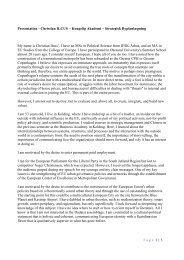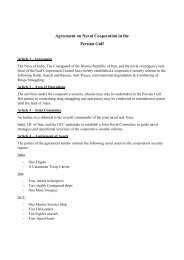diplomacy in antiquity
This is a review piece of books on diplomacy in antiquity begiining with mesopotamia, amarna, the phoenicians, the greeks and romans. The amarna book I found at an exposition at Glyptoteket, CPH.
This is a review piece of books on diplomacy in antiquity begiining with mesopotamia, amarna, the phoenicians, the greeks and romans. The amarna book I found at an exposition at Glyptoteket, CPH.
Create successful ePaper yourself
Turn your PDF publications into a flip-book with our unique Google optimized e-Paper software.
as a naval power and hegemony over the Delian association to Macedonia’s hegemony over the
Hellenes, the Hellenes practiced regime change, alliance diplomacy, financial bribery, and political
leadership as they pulled one another over the counter. Greeks thus introduced metropolis, urban
planning, and coinage into the world, magnifying the enterprise considerably. This system was
instituted and worked from the sixth century-second century B.C. At heart, this was an arrangement
of political leadership as much as coercion. It was, however, also a system that made strategizing
necessary and the deft use of military power paramount for providing security and political
leadership against external dangers, including northern marauding tribes. Adcock & Mosley (1974)
recounts how Rome gradually came to underwrite Greek freedom through a process of divergence
of interests among the Greeks – the Aetolian, and Athens-led alliances, Rhodos, Macedonia, and
the Archaen League resulting in a policy ‘devised with no ulterior motive in view’ but still leading
to the assumption of control through an administrative process of rule-and-divide, even as attention
had to be paid to Carthago, Egypt, and Persia. Whereas the Persian system never failed to back up
its dominion, it always relied on the indirect rule through reliance on Militus and Athens; the
Roman system came with administrators and a method of governance well-suited to assert
administrative control and claim physical presence. Rome thus came to dominate the Greeks
through deft armed intervention, not to mention outright destruction of city-states in disregard of the
logic and interdependencies of the Hellenic system’ (Adcock & Mosley, 1975:109). More often
than not, this would lay to Roman claims of a settlement.
The Roman Empire applied for the conduct of its foreign relations during its reign from the 1 st
Century to the 3 rd Century, a system of strategic relationships organized into a grand strategy. In
ascendance since the domination of the Greeks, the Romans went on to forge a system based on the
management of clients, the tactical organization of the army, and the strategic deployment of forces.
8








